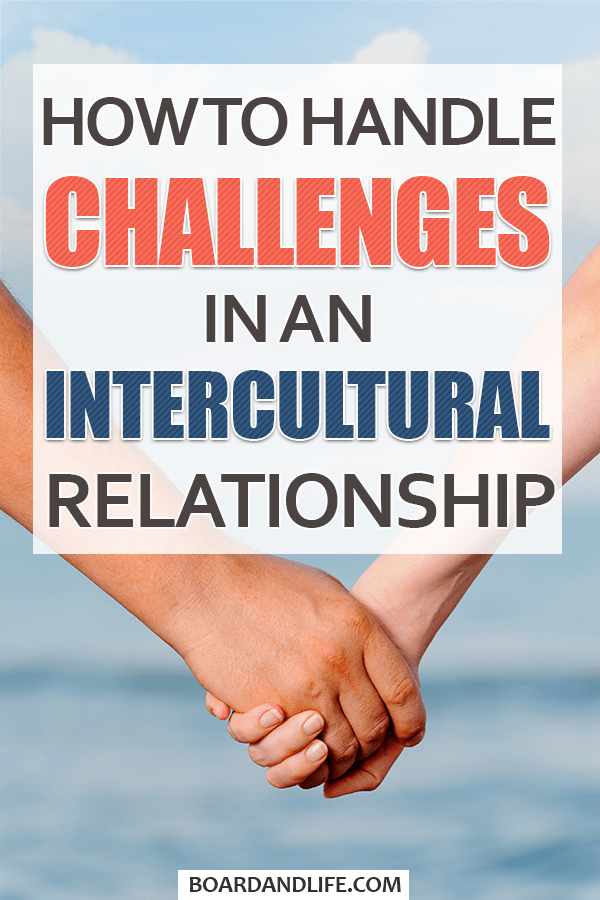Being In An Intercultural Relationship Can Come With Its Challenges!
This post is all about being in an intercultural relationship – the benefits, the challenges, and how we communicate through them. To be clear, we are an in intercultural relationship NOT an interracial relationship. Here at Board and Life, we are both of the same race – but were born in different countries, hence the different cultures.
If you read Bruce’s article about how being a yes person has shaped his life, you know a little bit about how we met. In case you haven’t read it, here is a quick recap – and some more details.
Essentially we met while both living abroad. Bruce, the Canadian, was studying in Europe – and Lisa, the German, was doing an internship in another European country. We started talking, eventually met and began dating. Now, a couple of years later we live together.
We’re quite happy with where we are in our relationship right now. But we have found that intercultural relationships can come with a unique set of challenges that you don’t really think about – until you actually experience them firsthand.
We wanted to write a blog post about some of these challenges and what we have done (and are doing) to overcome them since we know that there are many more intercultural couples out there. We always like hearing or reading about other couples’ experiences, so it’s only fair that we share our story as well.
The Childhood Memories

A challenge we sometimes face is having grown up with different movies, TV shows, games, books etc. When talking about our childhood memories, we sometimes forget that the other person might have no idea what we are talking about since they have never even seen that TV show we loved as a kid. This has happened to us multiple times.
One thing that has helped us in these cases is to be honest with each other – this way it never really becomes a challenge. Basically, if the person doesn’t know what the other person is talking about, we usually let the person share the memory.
This way, we learn more about the other person, didn’t stamp out a nice memory that they have, and ultimately support the person in being who they are.
One of the biggest examples is talking about actors/actresses and their voices in films. For example, everyone would probably agree that Morgan Freeman has a great and unique voice.
However, since Lisa grew up in Germany, all her movies were dubbed over in German… meaning that if a movie has Morgan Freeman in it she had NO IDEA how iconic his real voice was. It’s little things like that which trip you up if you aren’t thinking about the little details.
The Traditions
When it comes to traditions, there aren’t too many differences. That said, we do notice it when it comes to celebrating Christmas. Lisa celebrates Christmas on the 24th of December while Bruce celebrates it the 25th.
he fact that our families live so far away from each other can make it difficult to “choose” which family to celebrate with. This year, however, we have a schedule which allows us to see both sides on the proper days so we’ll try it out and let you know if it works. It involved flying across the ocean during Christmas.
We aren’t that religious so we don’t notice our cultural differences during the other holidays. If there are any “country-specific” holidays – like Canada Day on July 1st or German Unity Day on October 3rd – we usually explain to the other person about the day.
We cover the details like what the day means to the country, what it means to us, and celebrate any way that we can. For example, we found real maple syrup in Europe so Eric was very pleased about that!
The Food

Tied in with traditions a bit, another cultural difference we’ve run into surrounds the idea of food – not only what we eat, but when we eat, and how it’s prepared.
Lisa grew up in Bavaria so she is used to quintessentially Bavarian food like potato dumplings, Sunday roast dinners, potato salad, and her love of German bread – considered “real bread”.
Bruce grew up in Canada but has deep European heritage in the family, so he was used to eating things from Eastern Europe like pierogies and potato salad, but also Canadian things like maple syrup.
Generally, breakfast in North America can be bigger and greasier than in Europe. It’s not like Bruce ate bacon and eggs each morning for breakfast, but he certainly ate differently to start off the day than Lisa.
Now, Bruce is quite used to a more traditional European breakfast of bread, meat, and cheese. Lisa, having visited Canada, is also more accustomed to eating bigger breakfasts or “Sunday brunch” when we go out. In the end, food isn’t a huge deal for us since we are open-minded, well-traveled, and not picky!
The Language Barrier
Depending on where you are from, this might not be a problem for every intercultural couple, but it has been an issue for us. Lisa’s native language is German and while she speaks English quite well, not everyone in her family does. This can make it a little more challenging for Bruce to communicate with them.
Bruce is now trying to learn German to be able to make the language barrier less of an issue. At the same time, Lisa’s family is trying to improve their English language skills so they can have longer conversations with Bruce.
The important point here is that everyone tries to make things easier, which has admittedly been very helpful for us. Our families are very important to us so being able to all spend time together is great.
If you are in a similar situation and one of you is learning a new language, then check out our blog post with language learning tips that have helped us a lot. Maybe they can also help you make your language learning journey a little bit easier.
The Future

One of the biggest challenges we face in our intercultural relationships is making decisions about the future. Our families live on two different continents so we’ll never be able to be close to everyone.
That just means that we have to think extra long and hard about any big changes in our life since it usually means that one of us will have to move away from family.
We are fine with that as long as we are still able to visit people quite frequently. That’s one of the reasons why we are trying to build a career that’s not bound to one specific location and allows us to work from pretty much anywhere.
And there you have it – 5 things that have been a bit of a challenge in our intercultural relationship. In the end, we realize that we aren’t facing that many challenges in our intercultural relationship since we both grew up in contemporary Western societies. If one of us grew up in a completely different cultural setting, we probably would come across a lot of other challenges.
For example, public display of affection has never been a concern or point of conflict for us since we grew up in a very similar setting. We do, however, understand that it could be a bigger issue for other couples in intercultural relationships.
As always, Stay Curious,
-B&L
Pin it for later!


